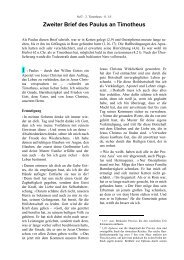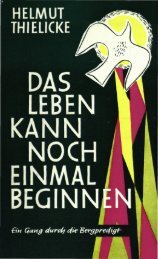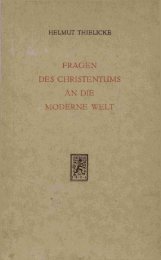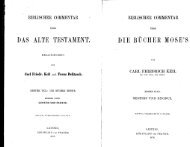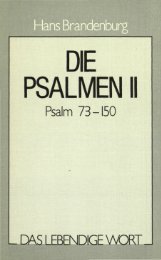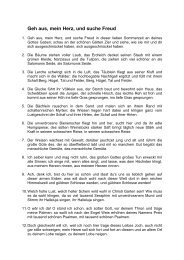Create successful ePaper yourself
Turn your PDF publications into a flip-book with our unique Google optimized e-Paper software.
aspect – the mind, which, according to Eccles,<br />
includes the I, the self, the psyche, and the will.<br />
Both components are interconnected via the<br />
external <strong>sense</strong> (experiences of which we are made<br />
conscious through our <strong>sense</strong> <strong>organs</strong>) as well as by<br />
means of the inner <strong>sense</strong> (thoughts, feelings,<br />
memories, dreams, imaginings, and intentions).<br />
It is not hard to draw some straightforward scientific<br />
conclusions from this. The dualistic view<br />
of man, equipped with this complex organ, the<br />
brain, is graphically illustrated in Figure 5, which<br />
indicates both the material and nonmaterial<br />
components. It is obvious from this representation<br />
that knowledge, strategies, thoughts and<br />
purposes cannot have a material origin.<br />
At this point, we have reached the limits of scientific<br />
research, because questions of man’s origin,<br />
and destiny after death, cannot be resolved<br />
by this model. But Eccles did have some inkling<br />
of the truth when he wrote: “The components of<br />
our existence in World 2 are not of a material<br />
nature and are thus not necessarily subject to the<br />
dissolution that destroys all the World 1 components<br />
of an individual at the moment of death”<br />
(from: Eccles, Zeier: Gehirn und Geist [Mind and<br />
Brain], München 1980, p 190).<br />
To know more about how man is really made up,<br />
we need to ask Him Who made human beings.<br />
For this purpose we consult the Bible, where this<br />
important question is answered on the very first<br />
page. God is the ultimate First Cause. And He<br />
created everything, as stated emphatically in<br />
Genesis 1:1: “In the beginning God created...”<br />
The purpose of this creation was human beings,<br />
as God had planned. We read in Genesis 1:26:<br />
“Let us make man...” If, like me, you have an engineering<br />
frame of mind, you will particularly<br />
appreciate God’s conceptual framework for the<br />
various stages of man’s creation:<br />
1. Plan<br />
2. Execution<br />
3. Result<br />
These steps are illustrated in Figure 7. The one<br />
verse, Genesis 2:7, is a masterpiece of concise<br />
96<br />
and exact formulation which is at the same time<br />
packed with information.<br />
Execution: Adam was created in two phases:<br />
In the first place God made his body from the<br />
substance of the earth. <strong>Our</strong> bodies comprise the<br />
same chemical elements as those found in the<br />
ground. It was quite a sensation when it was discovered<br />
in the 19th century that organic substances<br />
consist of the same elements as inorganic<br />
matter.<br />
The second important component was added<br />
when God “breathed into his nostrils the breath<br />
of life”. Only after this nonmaterial spirit had<br />
been infused into the physical body, did this new<br />
creation become a human being. This spirit<br />
should not be confused with the Holy Spirit. It<br />
should also be noted that the nonmaterial part,<br />
called mind by Eccles, is actually the soul in the<br />
biblical <strong>sense</strong>.<br />
Result: After the two different parts, the “earthly<br />
body” and “the spirit breathed by God”, had been<br />
joined, an entirely new creation came into being,<br />
namely the soul: “and the man became a living<br />
soul” (King James version). The result of this creative<br />
act of God, the joining of two different<br />
worlds, is illustrated in Figure 7. When these two<br />
completely different components are joined, the<br />
result of this union is the soul. The word “soul” as<br />
used in the Bible, has two meanings. It includes<br />
the entire human being, and it also describes one<br />
of the three components: body, soul, and spirit<br />
(1 Thess 5:23). This triadic combination describes<br />
man’s total reality. We exist because God willed it<br />
so. He planned it, and carried out His plan purposefully.<br />
Trialism: In light of the above biblical affirmations,<br />
it should be obvious that Eccles’ dualism,<br />
although an improvement on monism, is still<br />
inadequate for a complete understanding of<br />
human beings. Because the Bible mentions three<br />
distinct human components, we introduce the<br />
concept of trialism (Greek tri = three) (Figure 8).<br />
The fact that the joining of two components may<br />
give rise to a third and new phenomenon, can be




